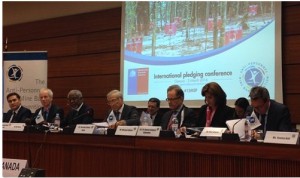DISARMAMENT & SECURITY .
An article from the International Campaign to Ban Land Mines
Former Secretary-General of the United Nations Kofi Annan joined Foreign Ministers from Canada, Chile and Colombia in a packed room of Geneva’s Palais des Nations on 2 March 2016, pledging support for the Mine Ban Treaty as states embark on the “final stretch” towards a mine-free world. More than 35 donor states and states with landmine contamination, as well as mine clearance experts and UN bodies, explained how they will work towards this goal.

Other eminent personalities lending their support during the high-level panel opening the First International Pledging Conference for the Implementation of the Anti-Personnel Mine Ban Convention included the President of the International Committee of the Red Cross, the Director of the United Nations Office in Geneva, the Head of Danish Demining Group, and the Campaign Manager of the International Campaign to Ban Landmines.
The half-day conference highlighted the need for sustained financial resources and political support to meet the goals of the Mine Ban Treaty to the fullest extent possible by 2025, an aspirational deadline embraced by States Parties to the treaty during an international meeting in Maputo in 2014. It also aimed at ensuring sufficient resources for the treaty’s Implementation Support Unit.
Chile hosted the event, as current President of the Mine Ban Treaty, announcing that “Much remains to be done but the end is in sight. We are now in the last stretch towards a mine-free world!”
Sri Lanka surprised the audience with the announcement that the Cabinet had approved accession to the Mine Ban Treaty, a major development in South Asia where only three states (India, Nepal and Pakistan) will remain outside the treaty after Sri Lanka formally accedes.
1 March 2016 marked 17 years since the entry into force of the Mine Ban Treaty, a historical instrument of disarmament and humanitarian law. Under the treaty, states have stopped using, producing and selling antipersonnel mines, they have destroyed some 49 million stockpiled mines, cleared vast tracts of land, and taken steps to provide assistance to victims of the weapon. With 162 States Parties, the Mine Ban Treaty is one of the most universally accepted treaties.
More about the Pledging Conference:
Highlights from the conference storified by Michael P. Moore from Landmines in Africa
Canada Recommits to a Mine-Free World while Sri Lanka Approves Accession to Ottawa Treaty, Mines Action Canada
A Mine-Free World Is Possible, Danish Refugee Council / Danish Demining Group
(Thank you to the Good News Agency for calling this to our attention.)